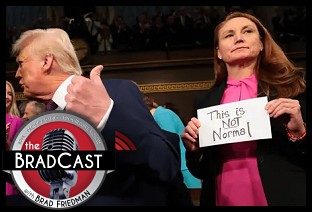 Early last month, a three-judge, U.S. 5th Circuit Court of Appeal panel affirmed the lower District Court's finding that Texas' draconian polling place Photo ID restriction (SB14), which threatens to disenfranchise 608,470 legally registered voters (and many others not already registered), violates federal law.
Early last month, a three-judge, U.S. 5th Circuit Court of Appeal panel affirmed the lower District Court's finding that Texas' draconian polling place Photo ID restriction (SB14), which threatens to disenfranchise 608,470 legally registered voters (and many others not already registered), violates federal law.
That ruling marked the third occasion in which a federal court has expressly found that the TX Republicans' strict ID law disparately impacted minorities and the poor. "Hispanic registered voters and Black registered voters," the 5th Circuit appellate panel observed in their recent ruling, "were respectively 195% and 305% more likely than their Anglo peers to lack [the requisite Photo] ID" now required to cast a vote at the polls under SB 14.
While the ruling ostensibly struck down SB14, finding it in violation of Section 2 of the Voting Rights Act (VRA), as we have previously explained, those 600k+ lawfully registered voters remain at risk of disenfranchisement during this Fall's 2015 elections and the 2016 Presidential cycle because the appellate panel failed to lift an "emergency" stay of the District Court's original permanent injunction intended to prevent enforcement of an unlawful Photo ID statute.
The failure of the appellate court to lift the stay on the lower court's no-uncertain-terms ruling may not have been problematic if, as contemplated by the 5th Circuit decision's mandate, the case were to be promptly returned to the District Court, which it directed to re-examine a separate issue --- whether the TX Legislature had a "discriminatory purpose" when it enacted SB14. That prompt remand would have permitted the District Court to fashion an interim remedy. Indeed, in its decision, the appellate panel suggested that the District Court issue an order directing TX to accept valid voter registration cards, in lieu of a very narrow handful of state-approved Photo ID, for all voting-related purposes. The 5th Circuit panel also, perhaps somewhat naively, called upon TX to cooperate in the prompt fashioning of that remedy.
Oh, that silly 5th Circuit panel...
The Texas slow-walk
As we've previously observed, citing U.C. Irvine Law Professor Rick Hasen, it was highly unlikely that TX, led by a Republican Attorney General Ken Paxton --- who has since, himself, been indicted on felony securities fraud charges --- would allow the matter to play out swiftly in the District Court. That's certainly not going to happen as long as TX Republicans believe they can again secure partisan advantage by enforcing the unlawfully discriminatory Photo ID law while further appeals continue to be adjudicated during the 2015 - 2016 election cycle.
Hasen and this site were correct. Paxton insists he has a right to enforce the unlawfully discriminatory statute during the pendency of further appeals. He has now filed a Petition for Rehearing En Banc [PDF] (to have the matter heard before the entire 5th Circuit, instead of the three-judge panel which unanimously ruled against the state) and a Motion to Stay the Mandate [PDF] not only during the pendency of its appeal to the full 5th Circuit, but during the pendency of a subsequent petition to have the matter heard before the U.S. Supreme Court. The indicted AG also filed a formal Opposition [PDF] to a Motion [PDF] filed by the U.S. Department of Justice (DoJ), which has sought a "limited remand to the District Court". That motion, if successfull, would direct the court to issue an order providing interim relief in order to prevent voters from being unlawfully disenfranchised during the next cycle of elections while the state's various appeals were heard.
On Sept. 2, the 5th Circuit issued an order [PDF] that these competing motions --- along with a separate motion filed by the Veasey plaintiffs --- for the issuance "forthwith" of a limited mandate directing the District Court to issue remedial orders were "carried." In other words, the 5th Circuit has agreed that it will rule on the substance of these competing motions. However, it has set no timeline for the ruling. Instead, it denied a separate motion filed by the Veasey plaintiffs which had sought to "expedite" the issuance of a mandate that would direct the District Court to promptly provide the interim relief. Under Federal Rules, the filing of the petition for rehearing or motion "stays the mandate until the petition or motion is ruled upon, unless the court directs otherwise."
Thus, as of now, the right of more than 600,000 lawfully registered TX voters to cast ballots in rapidly approaching elections hinges upon how and when the 5th Circuit panel rules on these still pending motions.
Can TX enforce an unlawful statute?
As we noted during an Aug 24, 2015 BradCast, "it seems nonsensical to say a law has been struck down but it is still in force. But that's basically where we stand right now."
While much of the 5th Circuit panel's original decision focused on whether there is sufficient evidence to support the District Court's finding that there had been a "discriminatory purpose" behind the "enactment" of SB14 --- that state Republicans not only enacted a discriminatory law, but they enacted such a law because it was meant to discriminate --- there can be no room for doubting that TX, led by its under-indictment Republican AG, is deliberately seeking to "enforce" a statute which, per the Lone Star State's own statistics, has a known retrogressive discriminatory impact on the voting rights of minorities and the poor.
As described above, when it handed down its decision, the unanimous 5th Circuit panel became the third federal court to arrive at that conclusion based upon uncontroverted evidence. In 2012, a unanimous three-judge U.S. District Court in Washington D.C., in a decision based upon Section 5 of the VRA, found that "the law will almost certainly have retrogressive effect" as "it imposes strict, unforgiving burdens on the poor, and racial minorities in Texas [who] are disproportionately likely to live in poverty." (That decision also confirmed an earlier finding and rejection of the statute by the DoJ as well.) Since then, the District Court, after a full bench trial, and then the 5th Circuit panel in this Section 2 case, have arrived at the same conclusion based upon the state's own statistics.
"This Court," the DoJ observed in its recent Reply [PDF], "unanimously affirmed that SB14 violates Section 2 of the VRA. Despite this Court’s merits determination, Texas had made clear that, absent an order from this Court, it will persist in enforcing SB14 as enacted."
Case for interim relief
In its Reply, the DoJ forcefully argues that the preservation of the lawful right to vote should be paramount. "It would be an unusual case in which a court would be justified in not taking appropriate action to insure that no further elections are conducted under the invalid plan," the federal agency argued, citing the Supreme Court's 1962 decision in Reynolds v. Sims.
The DoJ asserts that the 5th Circuit should either issue a limited mandate --- remanding the case to the District Court with directions to issue an order providing interim relief consistent with its initial decision --- or that, utilizing the All Writs Act, the 5th Circuit panel should directly provide the relief. With the latter course, as the DoJ argues, the panel could "ensure that Texas does not waste valuable time challenging the terms of any limited relief" granted by the District Court. The U.S. observed that while the All Writs Act "should be used sparingly," it is appropriate "in cases in which States have persisted in taking discriminatory action to the detriment of plaintiffs' rights" during the pendency of appeals. It cited cases in which the 5th Circuit had "granted interim relief pending an appeal on the merits. Here, this Court already has issued a unanimous decision holding that SB14 has a prohibited discriminatory result."
In addition to noting that TX does not contend that "interim relief is impracticable," the DoJ asserts that "the issuance of interim relief will protect the fundamental rights of African-American and Hispanic voters who face disproportionate and material burdens in obtaining a form of SB14 ID," while TX will have ample time to adjust its procedures since "early voting for the November 3, 2015, elections does not begin until October 19, 2015."
Time of essence
Despite the fact that TX has not argued that "interim relief is impracticable," it may already be too late --- at least with respect to the Oct. 19 start for early voting in the Nov. 3, 2015 election. At least that's the implication of the Supreme Court's sharply divided refusal last year to lift the 5th Circuit's stay of the District Court's permanent injunction of SB14. Just days before the 2014 elections, the 5th Circuit granted the "emergency" stay on the lower court's permanent injunction because it had been issued less than one-month prior to the November 2014 midterm election. The right-wing majority of the U.S. Supreme Court upheld that ruling on the basis that the risk of confusion at the polls brought on by the eleventh hour issuance of the injunction outweighed the fact that enforcement of SB14 would almost certainly disenfranchise more than 600,000 voters during last year's midterms in the state.
If the right of more than 600,000 lawfully registered TX voters to participate in the Nov. 3, 2015 election are now to be protected, the 5th Circuit should, ideally, immediately exercise its powers under the All Writs Act and provide the requested interim relief forthwith. To permit TX to continue to knowingly enforce a statute that violates Section 2 of the VRA would amount to nothing less than the encouragement of a lawless action to the detriment of the very rights which the VRA was enacted to protect.


 Vets Push Back at Trump, Musk Plan to Slash Health Care, 80K V.A. Jobs: 'BradCast' 3/27/25
Vets Push Back at Trump, Musk Plan to Slash Health Care, 80K V.A. Jobs: 'BradCast' 3/27/25 'Green News Report' 3/27/25
'Green News Report' 3/27/25
 Signal Scandal Worsens for Trump, GOP; Big Election Victories for Dems in PA: 'BradCast' 3/26/25
Signal Scandal Worsens for Trump, GOP; Big Election Victories for Dems in PA: 'BradCast' 3/26/25 'Emptywheel' on Why Trump NatSec Team Should 'Resign in Disgrace' After Signal Chat Debacle: 'BradCast' 3/25/25
'Emptywheel' on Why Trump NatSec Team Should 'Resign in Disgrace' After Signal Chat Debacle: 'BradCast' 3/25/25 'Green News Report' 3/25/25
'Green News Report' 3/25/25 Postal Workers Union Prez: USPS 'Belongs to the People, Not the Billionaires':
Postal Workers Union Prez: USPS 'Belongs to the People, Not the Billionaires': Sunday 'Suddenly Conceivable' Toons
Sunday 'Suddenly Conceivable' Toons We're ALL Voice of America Now: 'BradCast' 3/20/25
We're ALL Voice of America Now: 'BradCast' 3/20/25 'Green News Report' 3/20/25
'Green News Report' 3/20/25 What Trump's 'Timber Production Expansion' Means (and Costs): 'BradCast' 3/19/25
What Trump's 'Timber Production Expansion' Means (and Costs): 'BradCast' 3/19/25 Courts Largely Holding Against Trump, Musk Lawlessness: 'BradCast' 3/18/25
Courts Largely Holding Against Trump, Musk Lawlessness: 'BradCast' 3/18/25 'Green News Report' 3/18/25
'Green News Report' 3/18/25 Chief VOA Reporter on Outlet Falling Silent First Time Since 1942: 'BradCast' 3/17/25
Chief VOA Reporter on Outlet Falling Silent First Time Since 1942: 'BradCast' 3/17/25 Sunday 'The Usual' Toons
Sunday 'The Usual' Toons 'Green News Report' 3/13/25
'Green News Report' 3/13/25 Trump EPA Unveils Plans to Endanger, Sicken Americans: 'BradCast' 3/13/25
Trump EPA Unveils Plans to Endanger, Sicken Americans: 'BradCast' 3/13/25 Trump Nixed Enforce-ment Against 100 Corp. Lawbreakers: 'BradCast' 3/12/25
Trump Nixed Enforce-ment Against 100 Corp. Lawbreakers: 'BradCast' 3/12/25 Bad Day for 'Strongmen': 'BradCast' 3/11
Bad Day for 'Strongmen': 'BradCast' 3/11 WI Election Could Flip Supreme Court Control, Musk Jumps In: 'BradCast' 3/10
WI Election Could Flip Supreme Court Control, Musk Jumps In: 'BradCast' 3/10 'What Else Could a Russian Asset Do That Trump Hasn't?': 'BradCast' 3/6/25
'What Else Could a Russian Asset Do That Trump Hasn't?': 'BradCast' 3/6/25 The Longest, Dullest, Most Lie-Filled 'SOTU' Ever: 'BradCast' 3/5/25
The Longest, Dullest, Most Lie-Filled 'SOTU' Ever: 'BradCast' 3/5/25 Trump Bad for Biz... and Farmers... and Nat'l Parks... and...: 'BradCast' 3/4/25
Trump Bad for Biz... and Farmers... and Nat'l Parks... and...: 'BradCast' 3/4/25 Trump Targeting 50% Cuts, Office Closures at Social Security: 'BradCast' 3/3/25
Trump Targeting 50% Cuts, Office Closures at Social Security: 'BradCast' 3/3/25
 VA GOP VOTER REG FRAUDSTER OFF HOOK
VA GOP VOTER REG FRAUDSTER OFF HOOK Criminal GOP Voter Registration Fraud Probe Expanding in VA
Criminal GOP Voter Registration Fraud Probe Expanding in VA DOJ PROBE SOUGHT AFTER VA ARREST
DOJ PROBE SOUGHT AFTER VA ARREST Arrest in VA: GOP Voter Reg Scandal Widens
Arrest in VA: GOP Voter Reg Scandal Widens ALL TOGETHER: ROVE, SPROUL, KOCHS, RNC
ALL TOGETHER: ROVE, SPROUL, KOCHS, RNC LATimes: RNC's 'Fired' Sproul Working for Repubs in 'as Many as 30 States'
LATimes: RNC's 'Fired' Sproul Working for Repubs in 'as Many as 30 States' 'Fired' Sproul Group 'Cloned', Still Working for Republicans in At Least 10 States
'Fired' Sproul Group 'Cloned', Still Working for Republicans in At Least 10 States FINALLY: FOX ON GOP REG FRAUD SCANDAL
FINALLY: FOX ON GOP REG FRAUD SCANDAL COLORADO FOLLOWS FLORIDA WITH GOP CRIMINAL INVESTIGATION
COLORADO FOLLOWS FLORIDA WITH GOP CRIMINAL INVESTIGATION CRIMINAL PROBE LAUNCHED INTO GOP VOTER REGISTRATION FRAUD SCANDAL IN FL
CRIMINAL PROBE LAUNCHED INTO GOP VOTER REGISTRATION FRAUD SCANDAL IN FL Brad Breaks PA Photo ID & GOP Registration Fraud Scandal News on Hartmann TV
Brad Breaks PA Photo ID & GOP Registration Fraud Scandal News on Hartmann TV  CAUGHT ON TAPE: COORDINATED NATIONWIDE GOP VOTER REG SCAM
CAUGHT ON TAPE: COORDINATED NATIONWIDE GOP VOTER REG SCAM CRIMINAL ELECTION FRAUD COMPLAINT FILED AGAINST GOP 'FRAUD' FIRM
CRIMINAL ELECTION FRAUD COMPLAINT FILED AGAINST GOP 'FRAUD' FIRM RICK SCOTT GETS ROLLED IN GOP REGISTRATION FRAUD SCANDAL
RICK SCOTT GETS ROLLED IN GOP REGISTRATION FRAUD SCANDAL VIDEO: Brad Breaks GOP Reg Fraud Scandal on Hartmann TV
VIDEO: Brad Breaks GOP Reg Fraud Scandal on Hartmann TV RNC FIRES NATIONAL VOTER REGISTRATION FIRM FOR FRAUD
RNC FIRES NATIONAL VOTER REGISTRATION FIRM FOR FRAUD EXCLUSIVE: Intvw w/ FL Official Who First Discovered GOP Reg Fraud
EXCLUSIVE: Intvw w/ FL Official Who First Discovered GOP Reg Fraud GOP REGISTRATION FRAUD FOUND IN FL
GOP REGISTRATION FRAUD FOUND IN FL


































